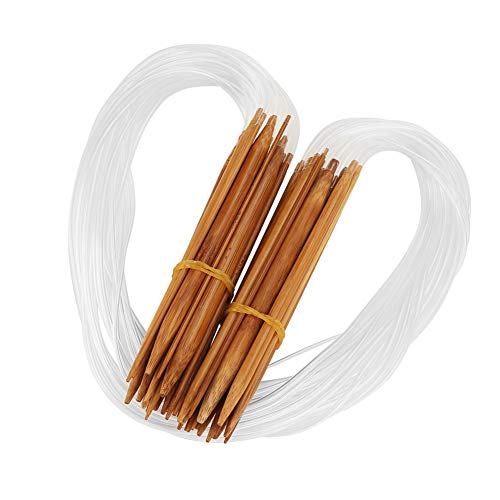Bamboo
It grows quickly and does not require the use of pesticides or herbicides to thrive. Bamboo also has a natural resistance to pests and diseases, making it an environmentally friendly option.
Another reason to choose bamboo
Bamboo is one of the strongest materials on earth, making it ideal for use as
They slide easily through yarn, making for a pleasant
Knitting Help – Bamboo Needles Review
If you’re looking for a new pair of
However, some knitters find that bamboo needles can be a little slippery, which can make them difficult to work with.
If you’re considering bamboo needles, be sure to try them out first to see if they’re the right choice for you. In general, they’re best suited for intermediate or experienced knitters who are comfortable with working with slippery materials.
These Knitting Needles are Ideal for Beginners And are the Least Expensive
As a beginner, you may be wondering which
They’re smooth and easy to work with, and they’re very affordable. These needles also come in a variety of sizes, so you can find the perfect ones for your project.
These plastic
They’re very affordable and they come in a variety of sizes. These needles are also quite sturdy, so they can handle more wear and tear than some of the other options.
These metal
They’re incredibly strong and durable, so they’ll last you a long time. And since they come in a variety of sizes, you can find the perfect ones for your project.

Credit: www.amazon.com
What are the Advantages of Bamboo Knitting Needles?
Bamboo
2. They’re strong and durable: Bamboo is a very strong material, so bamboo
No more snagging!
4. They’re lightweight: Bamboo is lighter than most other materials used for making
Is It Easier to Knit With Bamboo Needles?
There is no definitive answer to this question as it depends on the individual knitter’s preferences. Some people find that bamboo needles are easier to use because they are lightweight and have a smooth surface. Others prefer metal or plastic needles because they feel more sturdy and provide more control over the stitches.
Ultimately, it is up to the knitter to decide what type of needle works best for them.
What Material is Best for Knitting Needles?
There are a variety of materials that can be used for
They can also create a very slick surface, which can be helpful when working with slippery yarns. However, they can be difficult to grip for some people, and they can make a clicking noise as you knit.
Plastic needles are lightweight and inexpensive, making them a good choice for beginners or those working on smaller projects.
They’re also relatively quiet to use. However, they’re not as strong as metal needles and can break more easily if dropped or mishandled.
Bamboo needles are eco-friendly and smooth to the touch, making them pleasant to work with.
They’re also lightweight like plastic needles. However, bamboo is not as strong as other materials so it’s important to take care when using them with heavier yarns or large projects. Bamboo needles can also splinter over time if not properly cared for.
Wooden needles are classic tools that have been used by knitters for centuries. They’re typically very smooth and easy to work with, although this will depend on the type of wood used (some woods are naturally rougher than others). Wooden needles can be more expensive than other options but they’re often worth the investment since they last longer when properly cared for.
Are Bamboo Knitting Needles Better Than Plastic?
Bamboo
Bamboo also doesn’t require the use of harmful chemicals in its production, as plastic does. So if you’re looking for an eco-friendly option, bamboo is the way to go.
In terms of the actual
They glide through yarn more easily and don’t make that irritating clicking sound that some plastic needles do. Bamboo also has some natural grip to it, which can help prevent your yarn from slipping off the needle mid-knit. And because they’re made from a natural material, they tend to be warmer to the touch than plastic needles, which can be nice in cold weather!
Of course, there are also downsides to bamboo needles. They can be more expensive than plastic needles, and they’re not always as strong or durable (though this depends on the quality of the needle). They can also splinter if you drop them or knit too tightly with them.
And because they’re made from a natural material, they may not be available in as many colors or sizes as plastic needles (though this is changing as bamboo needle manufacturers expand their offerings).
So what’s the verdict? Are bamboo
It really depends on your personal preferences! If you’re looking for an eco-friendly option or you simply prefer the feel of bamboo under your fingers, then yes – go ahead and give them a try!
Conclusion
If you’re looking for an eco-friendly option for your
They’re also lightweight, so they may be a good choice if you have arthritis or other hand pain.

